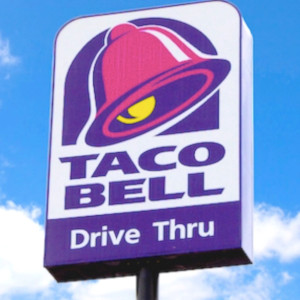A recent class action suit against Burger King alleged the brand had advertised burgers that were approximately 35 percent larger than those it actually served. Now, a Ridgewood, New York man is suing Taco Bell over under-filled wraps…
 The Crunchwrap Supreme as pictured in ads and menus (left), and the Crunchwrap
The Crunchwrap Supreme as pictured in ads and menus (left), and the Crunchwrap
Supreme actually served (right). (Photos from actual statement of claim.)
It may be a sneaky way to save on costs in these desperate days of soaring food prices. Not one, but two international Fast Food brands are being sued over alleged deceptive advertising and ‘overstating menu items’.
Taco Bell under scrutiny
The Bell has, for the past few years, been trying to redeem its once-sterling brand image by bringing in new top management, revamping its menus and implementing a whole host of business model modifications.
But its squeaky-clean new image is being sullied by a new lawsuit that claims the Bell is deceiving patrons by overstating menu items in some ads. In legal terms, as written in the suit, that’s ‘unlawful deceptive acts and practices’, and ‘misleadingly, inaccurately, and deceptively’ depicting its Mexican Pizzas and Crunchwraps in photos and ads.
Plaintiff Frank Siragusa compared a Mexican Pizza he’d just bought to photos of one he’d seen online. He estimated his IRL pizza contained only about 50 percent of the volume of toppings shown on the one in the photo.
The big picture
Siragusa’s statement of claim goes even further, accusing Taco Bell of dastardly business practices that harm not only consumers but competitors:
“Taco Bell’s actions are especially concerning now that inflation, food, and meat prices are very high and many consumers, especially lower income consumers, are struggling financially.”
“Taco Bell’s promise to consumers of a large portion of food with their purchase are also causing consumers to come to, or order from, Taco Bell’s restaurants and make purchases that they would not have otherwise made.”
“Taco Bell is also unfairly competing with restaurants that more fairly advertise the size of their menu items.”
Perhaps the most damning aspect of the lawsuit is the photos included, that clearly show a difference between the content of menu items as depicted in the ads and menu photos, and the products as actually served.
 The Mexican Pizza as pictured in ads and menus (left), and the Mexican Pizza
The Mexican Pizza as pictured in ads and menus (left), and the Mexican Pizza
actually served (right). (Photos from actual statement of claim.)
On the other hand
Legal experts say the Bell is likely to come back with claims that, since they don’t state quantities of filings or toppings for their Crunchwraps or Pizzas, they are technically not cheating. If it was, say, McDonald’s serving a Quarter Pounder that could be proven to not weigh at least 4 oz. before cooking, the case would be more clear-cut.
However… “Taco Bell does not adequately disclose the weight of the beef or filling,” one of Siragusa’s attorneys, Anthony Russo, told Reuters. “Plaintiff did not make any purchases of the product based on any weight disclosure but solely based on the picture of the product, as we believe most consumers do.”
My take
As I hinted above, skimping on the meat in Fast Food menu items is probably the easiest way for brands to save on costs. And they’re hurting for number of reasons.
Many jurisdictions have mandated steep increases on the minimum wages paid to Fast Food workers.
FF brands have also been pouring millions into developing new business models for the future, emphasizing delivery, take-out and drive-thru service over eat-in dining.
Hand in hand with that goes a new interest by FF chains in automating their operations to reduce the size of their payrolls.
What Taco Bell, Burger King and other Fast Food players don’t seem to get is, consumers aren’t stupid. And folks like Mr. Siragusa and Walter Coleman, the Florida resident pursuing the Burger King lawsuit, are speaking out loudly and publicly on behalf of legions of customers. If I was BK or TB top brass, I’d be really concerned about how badly the current lawsuits are hurting to my brand profile…
~ Maggie J.

